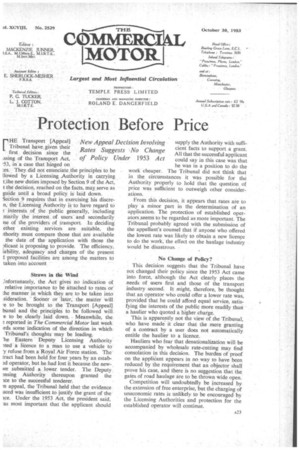Protection Before Price
Page 25

If you've noticed an error in this article please click here to report it so we can fix it.
r HE Transport [Appeal) Tribunal have given their first decision since the .ssing of the Transport Act, ,53, in a case that hinged on res. They did not enunciate the principles to be llowed by a Licensing Authority in carrying Lthe new duties imposed by Section 9 of the Act, t the decision, reached on the facts, may, serve as guide until a broad policy, is laid down.
Section 9 requires that in exercising his discren, the Licensing Authority is to have regard to interests of the public generally, including madly the interest of users and secondarily }se of the providers of transport. In deciding ether existing services are suitable, the tthority must compare those that are available the date of the application with those the ?ficant is proposing to provide. The efficiency, lability, adequacy and charges of the present 1 proposed facilities are among the matters to taken into account Straws in the Wind infortunately, the Act gives no indication of relative importance to be attached to rates of the manner in which they are to be taken into Sideration. 'Sooner or later, the matter will 'e to be brought to the Transport [Appeal] bunal and the principles to be followed will e to be clearly laid down. Meanwhile, the !. reported in The Commercial Motor last week irds some indication of the direction in which.. Tribunal's thoughts may be leading.
'he Eastern Deputy Licensing Authority -toted it licence to a man to use a vehicle to y refuse from a Royal Air Force station. The. tract had been held for four years by an estab operator, but he had lost it because the new-, Ler submitted a lower tender, The Deputy msing Authority thereupon granted the ice to the successful tenderer.
n appeal, the Tribunal held that the evidence aced was insufficient to justify the grant of the ice. Under the 1953 Act, the president said, 'as most important that the applicant should supply the Authority with sufficient facts to support a grant. All that the successful applicant could say in this case was that he was in a position to do the work cheaper. The Tribunal did not think that in the circumstances it was possible for the Authority properly to hold that the question of price was sufficient to outweigh other considerations.
From this decision, it appears that rates are to play a minor part in the determination of an application. The protection of established operators seems to be regarded as more important The Tribunal probably agreed with the submission of the appellant's counsel that if anyone who offered the lowest rate was likely to obtain a new licence to do the work, the effect on the haulage industry would be disastrous. • No Change of Policy?
This decision suggests that the Tribunal have not changed their policy since the 1953 Act came into force, although the Act clearly places the needs of users first and those of the transport industry second. It might, therefore, be thought that an operator who could offer a lower rate was, provided that he could afford equal service, satisfying the interests of the public more readily than a haulier who quoted a higher charge.
This is apparently not the view of the Tribunal, who have made it clear that the mere granting of a contract by a user does not automatically entitle the haulier to a licence.
Hauliers who fear that denationalization will be accompanied by wholesale rate-cutting may find consolation in this decision. The burden of proof on the appliCant appears in no way to have been reduced by the requirement that an objector shall prove his case, and there is no suggestion that the gates of road haulage are to be thrown wide open.
Competition will undoubtedly be increased by the extension of free enterprise, but the charging of uneconomic rates is unlikely, to be encouraged by the Licensing Authorities and protection for the established operator will continue.




















































































